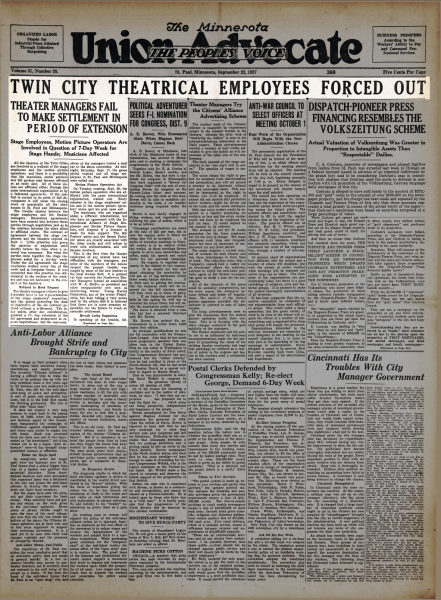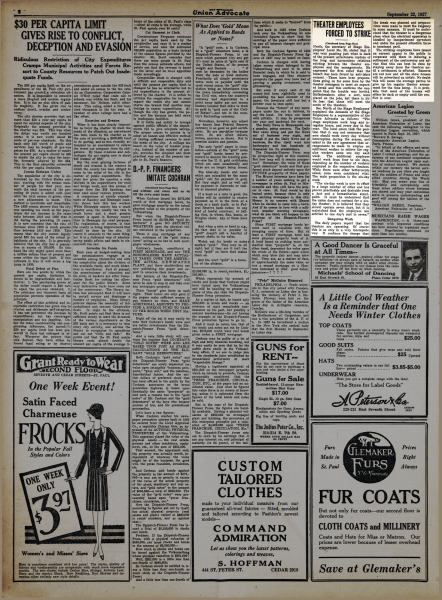| Artifact Type | Labor Newspapers, Sources |
| Publication | Minnesota Union Advocate |
| Volume | 31 |
| Number | 38 |
| Page Number | 1, 6 |
| Place | St. Paul, MN |
| Publication Date | September 22, 1927 |
| Transcript | Show/Hide |
|
Headline: “Twin City Theatrical Employees Forced Out” Subhead: Theater Managers Fail to Make Settlement in Period of Extension Stage Employees, Motion Picture Operators Are Involved in Question of 7-Day Week for Stage Hands; Musicians AffectedAll the theaters of the Twin Cities are involved in a walkout of the stage employees and the motion picture operators; and there is a possibility that the musicians, scenic painters and bill posters may become affected at an early date. All of these unions are affiliated either through the same international organization or by a federated agreement. If the conflict is carried to its point of full development it will mean the closing down of practically all the show houses in St. Paul and Minneapolis. The trouble started between the stage employees and the theater managers. Heretofore agreements have been entered into between these parties through negotiation just as in the relations between the other allied or affiliated crafts. The contract or agreement between the stage employees and the theaters expired on Sept. 1. Little attention was given the question of negotiation until shortly before the time when a renewal was necessary. But when the parties came together the stage employees asked for a six-day week. Under the old agreement, the stage Employees worked every day of the week and at irregular hours. It was contended that this practice was detrimental to the welfare of the workers and was not necessary to the conduct of the business. Refused to Heed RequestThe theater managers refused to give favorable heed to the representations of the stage employees’ committee, and the period preceding the date of expiration of the old contract arrived without a settlement. The local union, after due consideration, granted a 17-day extension of the old agreement and endeavored to resume negotiations; but the representatives of the managers turned a deaf ear to the union committee. At midnight, Saturday, Sept. 17, the grace period expired and all stage employees in St. Paul and Minneapolis were called out. Motion Picture Operators ActOn Tuesday evening, Sept. 20, the motion picture operators who are affiliated with the same international organization, walked out. Every member in the stage employees’ union and in the motion picture operators’ union quit his post upon call. The musicians, who are organized under a different international, but who have an agreement with the International Alliance of Stage Employees and Motion Picture Operators, will respond if a demand is made for their support. The Bill Posters’ union and the Scenic Painters’ union are closely associated with the other crafts and will refuse to work with strikebreakers, and will become involved. This is the first time the theater employees of any branch have had difficulties with the managers, and some of the members of the union suspect the present trouble was sought by some of the new leaders in the local theater field. It is pointed out that recently the Northwest Theater Managers formed an association with W. A. Steffes as president and other comparatively new men as dominating forces. Young Harold Finkelstein, son of the senior Finkelstein, has been taking a very active part in affairs and it is believed that these are in some measure responsible for the failure to reach an amicable settlement. Breach Looks SuspiciousIn speaking of the trouble, Mr. North, the secretary of Stage Employees’ Local No. 20, stated that it was very puzzling just what is back of the present unfortunate rupture of the long and harmonious relations existing between the theater employees and the managements. He expressed the firm relief that the breach has been forced by anti-labor counsel. There have been preparations going on for some time by the theater managers to meet an expected break and this confirms the suspicion that the trouble was invited. Strikebreakers after a sort, were placed on the jobs, but there is little fear that these will meet the needs of the theaters. Sec. North of the Stage Employees’ explained the demands of the Stage Employees to a representative of the Union Advocate as follows: “The stage employees work long and irregular hours, and every day in the year. The local union took the position that it was not necssary that men should work every day without interruption during the season, and asked in the agreement that arrangements be made to employ an additional worker to relieve the regular workers some one day each week. The additional employee would work from four to six days, depending on the number of workers employed in the respective theaters. While there were other betterments asked, none were considered vital. The main proposition is the six-day week. “The six-day week is now in effect in a large number of cities and has proven practicable and desirable from a just and a humanitarian standpoint. It must be understood that the union does not contend for a six-day theater; it is believed that they should operate seven days, but it is maintained that the employees are entitled to one day’s rest in seven.” Dangerous WorkThe daily papers report that the theaters are operating. Of course this is so only in a very incomplete way. It confirms the charge that the break was planned and preparations were made to meet the exigency in some measure. It must be understood that the theater is a dangerous place when the electrical apparatus is handled by inexperienced operators and under the present situation there is imminent peril. The striking employees have issued an earnest appeal to the public to cooperate with them in inducing a settlement of the controversy and advise that this can best be done by staying away from the theaters until a settlement is effected. Banners are out now and all the show houses will be advertised as unfair. No doubt this will cause the average patron to give up his regular theater amusement for the time being. It is probable that most of the houses will either be dark or empty until the conflict is over. |
|
| Archive | Union Advocate Digital Archives |
| Read In Context | http://news2.arcasearch.com/us/ua/initArcaCode.asp?paper=___ |
| Citation | “Twin City Theatrical Employees Forced Out,” Minnesota Union Advocate, September 22, 1927. |
| Location | MinneapolisMinnesotaSaint Paul |
| Tags | 1920s1927September 1927 |

